We have been neglecting the blog to be with family, but luckily for us reader erp is much more diligent, and has sent us a recipe for Pumpkin Mousse.
Erp tells us that this is her assemblage of ingredients:
We are quite pleased to see our book included, but be aware that this may provide too much roughage for some and can be excluded from the recipe!
A more conventional list of ingredients is:
- 1 envelope unflavored gelatin (2 1/4 teaspoons)
- 1/4 cup cold water
- 1 (15-ounce) can pure pumpkin
- 1/4 cup packed light brown sugar (original recipe calls for 3/4 cup!!!)
- 1/2 teaspoon cinnamon
- 1/2 teaspoon nutmeg
- 1/4 teaspoon ground ginger
- 1/8 teaspoon salt
- 2 1/4 cups chilled heavy cream
- 1 1/2 teaspoons pure vanilla extract
- Garnish: ground cinnamon (optional)
- Equipment: 8 (8-ounce) glasses
Sprinkle gelatin over water in a small saucepan and let soften 1 minute. Bring to a bare simmer, stirring until gelatin has dissolved. Whisk together gelatin mixture, pumpkin, brown sugar, spices, and salt in a large bowl.
Beat 1 cup cream with ½ tsp. vanilla until it holds soft peaks, then fold into pumpkin mixture gently but thoroughly. Spoon about 1/2 cup pumpkin mixture into bottom of each glass. Here it is at this stage:
Chill until set, at least 2 hours.
Meanwhile, beat remaining 1 1/4 cups cream with remaining 1 tsp vanilla until it holds soft peaks:
Dollop each with whipped cream before serving. Top with shaved dark chocolate or sprinkles if desired. The finished product:
Hat tip: KitchenDaily.com.
Thanks erp!







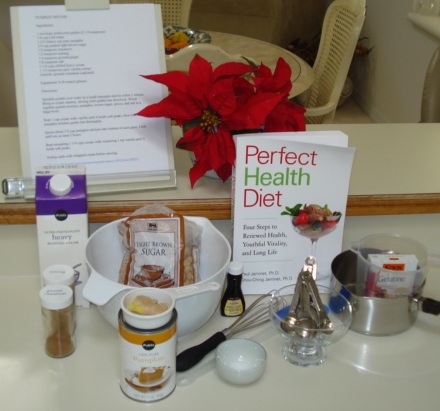
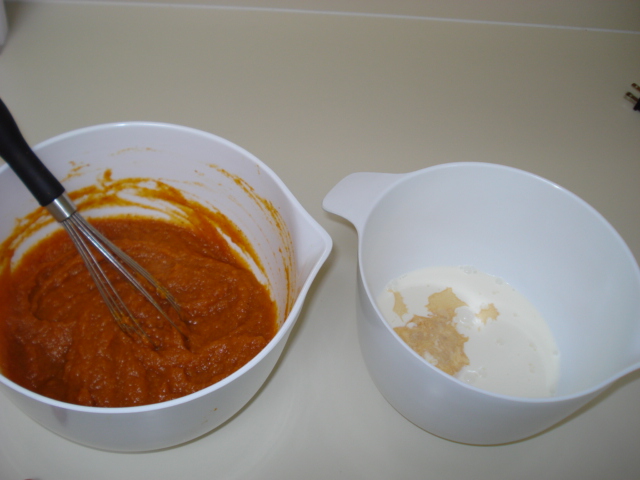
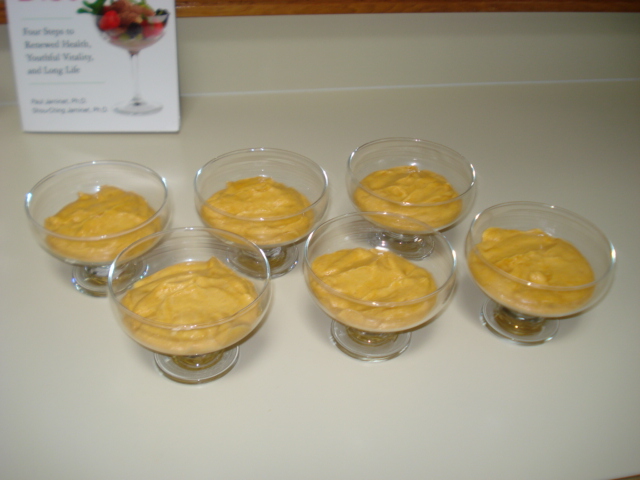
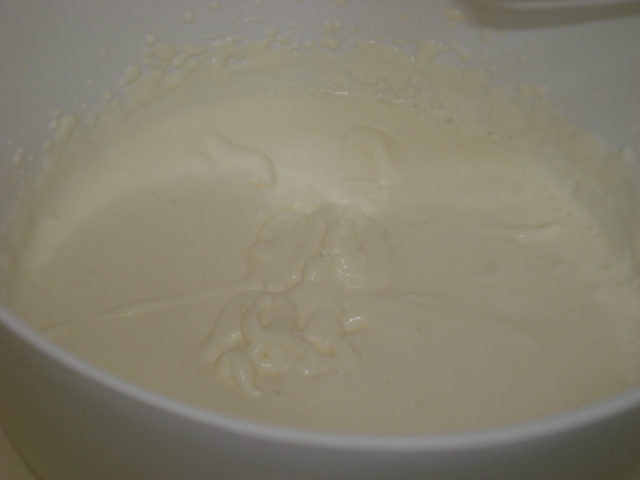
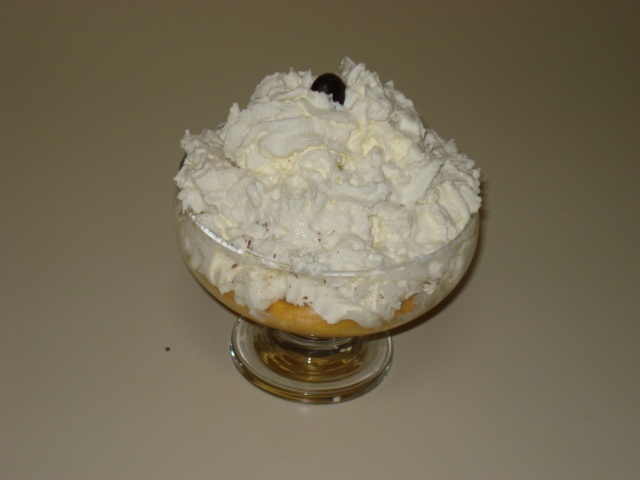




Just got the book in the mail a few days ago. Was really excited to receive it, and have been enjoying it very much.
I wanted to ask you about supplementation. Chris Kresser recommends your book highly, and you quote him on the back cover, and yet he (like many other in the paleo/primal/evoluationary blogosphere) seems to be pretty strongly opposed to supplementation.
http://thehealthyskeptic.org/throw-away-your-multivitamins-and-antioxidants
It seems compelling to me that food synergy is important – at the same time, I know there are clear cases where supplementation can be life saving. I’m curious as to what your take is on the arguments against supplementation, and whether your recommendations stem from your own self experimentation with these supplements?
Currently I basically follow the PHD (yours and a few other blogs have amazingly led this lifelong vegetarian to experiment with eating meat), and I take Green Pastures’ fermented CLO/high vitamin butter oil blend to ensure sufficient D, K, and A. Nothing else at the moment. Trying to decide whether to add Mg, Selenium, Iodine, Copper, and Vit C. I’ve always been in very good health, so am not trying to address any problems (other than insufficient sleep – will add melatonin.) Just would like to achieve the optimal health possible based on what we know.
Anyway, thanks again for all the information you’ve made available. Have a great new year.
Hi bappanchick,
Our reasoning is largely spelled out in Step 3 of the book, so when you get there it may give you a better understanding of our view of the issue. We think that modern foods and demineralized water tend to be low in nutrients, and that modern lives are very busy and not amenable to spending time shopping, cooking, and eating and so people frequently end up undernourished from food alone.
I will write Chris and ask him if his views have evolved since April.
But I think we’re not that far apart. We have a chapter on “nutritional supplements to avoid,” in which we cite some supplements that have a bad record or that are better obtained from food. Some of those are cited by Chris in his post. And in Chris’s post he recommends D, K2, and magnesium, which are 3 of our 8 highly recommended supplements.
The “food synergy” point of view is not actually opposed to supplementation. It’s really another way of stating the “economic analysis of diet” perspective — that nutrients are complements to or substitutes for one another, and you need good proportions for optimal health.
If there is a difference, it is that the “food synergy” point of view emphasizes that the range of things we call “nutrients” may be very broad. For instance, even plant toxins may count as nutrients if they have beneficial effects, like poisoning pathogens in our gut, or improving our cellular stress response through hormesis.
So we would share Chris’s fondness for a well-nourishing diet with a diversity of foods, but emphasize that there are some nutrients which are safe in high doses, and for which deficiencies are common, and supplementation of which will have a very high probability of improving your health.
Do keep in mind that there are food substitutes for some of our recommended supplements. For instance, we eat beef liver once a week rather than supplement copper. We are not opposed to well-designed food only diets, but want to make it easy for everyone to be healthy, even those who can’t tailor their diet so easily.
Best, Paul
This looks good. I like using a touch of molasses for the brown sugar flavor and getting the rest of the sweetness from stevia.
Thanks for your detailed response Paul. What you say here makes alot of sense; will look forward to reading this section of the book. I find the PHD’s combination of self-experimentation and scientific references very compelling. Would be interested to hear Chris’s perspective if he writes back.
For now will add the mg and melatonin, and try to get the rest through the food alternatives you’ve listed. Glad you’ve added the amazon links.
Thanks again and happy holidays!
-BC
Hi BC,
Yeah, Paul and I aren’t that far apart. In general I think it’s best to get all of the nutrients we can from food, and I’m sure he’d agree.
As you pointed out, I routinely suggest FCLO for the A, D & K, as well as E and quinones. I also often recommend Mg supplementation because most people I test are deficient in it.
For selenium and iodine, I suggest regular consumption of seafood and 2-3 Brazil nuts a day (selenium only). I don’t take vitamin C every day, but do take 1-2g/d if I feel like I’m fighting a cold or flu.
The only one Paul and I may disagree on is melatonin. It’s a hormone, of course, and hormones are incredibly potent substances. Exogenous hormone supplementation inhibits feedback mechanisms and throws off our natural hormone balance. Melatonin and cortisol exist in a tightly regulated relationship which determines circadian rhythm and immune function, among other things. Taking melatonin regularly can adversely impact the delicate interplay between these two hormones, and I think there are better ways to normalize this system than taking melatonin itself.
Otherwise, I think Paul’s recommendations are very close to my own.
Thanks, Chris.
Melatonin is an interesting case. My perspective is that the most common cause of melatonin deficiency may be bacterial or viral infections of the brain. The immune response destroys tryptophan, creating low levels of melatonin and serotonin. Serotonin can feed bacteria and needs to be low, but melatonin does not — in fact it is antimicrobial. In these circumstances supplementing melatonin restores the normal balance of hormones.
Normally low levels of a hormone should be assumed to be a beneficial response to the disease, but in infections low levels of melatonin are probably an unfortunate side effect of the need to keep tryptophan away from pathogens.
But of course, these judgements are tentative and are subject to revision as further evidence emerges.
Best, Paul
Thanks so much Paul and Chris.
Paul, I just finished reading your chapter on supplements – so much information to digest, yet very accessible, thank you. One particular point that was eye opening for me was the section on hypothyroidism. Having mild hypothyroid symptoms I’ve been tested a couple of times but always told I was in the range of normal and didn’t need to worry. As soon as I read that section of your book, I went to go check my TSH levels from my physical a year ago, and found that my TSH reading was 3.5! The doctor said this was normal so I never thought about it any further. I’ll definitely follow the steps you outline in the book for bringing TSH levels under control. I am so glad I got the book.
One thing that’s been puzzling me – have googled to no avail: I was raised (lacto-ovo) vegetarian but added meat into my diet about a month ago, shortly after giving up gluten. Was convinced by yours and a few other blogs of the health benefits of meat figured I’d try it for a few months. Overall I’ve had no problems and have mostly enjoyed it, but one thing I’ve noticed is that my heartbeat has become very “loud” to me and my resting heart rate seems to have gone up. I checked it today and it was 90 bpm, which I understand is quite high. And whenever I’m laying down it’s so loud it’s distracting. Do you think it might be related to adding meat in? I’ve never had red meat in my life prior to last month (I’m in my early 30s) so I thought it was a transitional thing perhaps but it seems to be persistent.
Thanks again for all the info you’ve made available.
-BC
Hi BC,
I’m glad you’re addressing your thyroid! That’s important. Be sure to go slowly with any iodine supplementation.
Pulse is largely controlled by the need to provide sufficient oxygen to the brain. If blood pressure is low, or if you’re anemic, then the pulse will race to compensate. Do you know your blood pressure? Does it vary between standing and lying? Do you get dizzy when standing up suddenly?
Another possibility which would tie in to your adoption of meet is beef allergy. This is discussed in a post by Matt Metzgar linked in Chris Masterjohn’s new review of our book: http://www.mattmetzgar.com/matt_metzgar/2010/12/beef-allergy-ii.html.
You might try eating more salt, potassium (potatoes, bananas, vegetables are good sources), and drinking extra water; and testing beef avoidance. If it persists, ask your doctor to look into it at your next visit. 90 bpm definitely seems high.
Best, Paul
Hi Paul, regarding red meat I realized that I also have problems with it.
I have never been a great meat eater in my life but I started eating it a lot when I began low carbing 16 months ago. Since then I have always had white meat (chicken breast) and very rarely red meat.
During summer I started eating 150g of red meat (pork, beef etc) a day. I remember in this period of time, what I always thought was an oral thrush (candida infection), flared every morning. I had something like this:
http://www.clivir.com/pictures/yeast/thrush2.jpg
My tongue looks exactly like this (I have had a cracked tongue since I was a child) and sometimes in the morning I find white patches/strings which burns a little.
Every time I eat red meat the next day I have a flare, I finally realized it some days ago.
Do you think it can be a fungal infection or maybe a viral/bacterial infection?
I can’t explain why I have problem with red meat but not white. The only differences I think are the iron content and the digestibility.
Maybe I have some bacteria that likes iron a lot.
Hi Kratos,
Beef uses two kind of sialic acid (a sugar that glycosylates proteins and is involved in immune response) and humans have only one. The non-human beef sialic acid can help carry some bacterial toxins into the body and can trigger an immune response. It tends to produce autoimmune type symptoms, like allergy or asthma.
I would have to look into the literature on this, but it doesn’t sound like an infection if it always follows eating red meat and never appears any other time.
Best, Paul
Hi Paul, very interesting!!
However some days ago I haven’t eat beef but pork and it flared the next day.
I did a food intollerance pannel (IGG) last year but it was negative for beef and pork but very positive for lamb and almost all fish (except tuna).
Hi Paul, actually, I’ve only been eating lamb and turkey, no beef. (Had added fish a couple of years ago.) I’ll have to look up whether there is such a thing as allergy to lamb.
I’ve always had pretty low blood pressure; I suppose it’s entirely likely that I could always have had a higher pulse rate as well and not noticed. My pulse is just so LOUD to me these days that I am acutely aware of it. It’s like my heart is beating really hard and somewhat fast all the time.
I will happily add more salt and potatoes/bananas/veggies — all things I love. Hopefully it will address the issue.
Thanks for the caveat on the iodine, will make sure to be gradual. Hope the supplement route is effective. Per the stats you cite in the book, a TSH level of 3.5 sounds pretty scary!
Happy new year,
BC
The pumpkin pudding looks and sounds delicious. I would replace the sugar with honey or honey and stevia (my usual sweeteners used in combination) but other than that I will probably leave the rest of the recipe as is. I have made a honey and stevia sweetened whipped cream for several years and used it to top fruit or in chocolate mousse.
I look forward to reading more of your posts and your book.
This recipe is surprisingly good, I am eating it right now. 🙂
One adjustment I made was adding 1-2 TBLS. real maple syrup to the whipped cream. I’m just starting this, maybe I can work up to no sugar. 😉
Hi Paul. I love your site. I have spent entirely too much time here in the last few months…
Wanted to post and say this recipe is absolutely delicious! I use half the sugar called for (2 TBSP) and it is plenty sweet. I am the only one in the family 100% on the diet, so it is only sweet enough for me and the baby- she loves it, too! Since the 2 of us cannot finish a whole batch before it goes bad, I divide it up and freeze it in serving size portions. It is like a fluffy pumpkin ice cream!
I also wanted to mention that I have had amazing success on your diet after struggling for years to balance my motherly demands and lose weight. I have been breastfeeding and/or pregnant for almost 6 years, and I found that when following low-fat or low-carb diets while breastfeeding, milk supply will diminish. For years I tried cutting calories, cutting carbs, cutting fat, etc, always with the same result= no milk and a mad baby. I started PHD in December and have lost 15 pounds so far (about 10-15 more to go), I feel great, and I have TONS of milk. And the milk has changed! I can tell because the babies (ages 2 and 10 mos) don’t seem to need to nurse as often, and their bowel movements are much healthier looking. Sorry for TMI, but I know that sharing my experience will help someone else eventually.
Anyway, thank you for your expertise and the wonderful book. And the delicious pumpkin mousse. 🙂
Hi Meg,
Great! Thanks for the info on the milk and babies, we’re very interested in how our diet affects all aspects of health and yours is the first report we’ve had on breast milk. Thank you!
Anyone got any suggestions for diverticulitis?
I’ve also heard melatonin messes with things so I’ve been recommended GABBA when I feel anxious or am ready to wind down for bed but can’t seem to “shut off.” Maybe people could try that. It’s an amino acid, not a hormone.